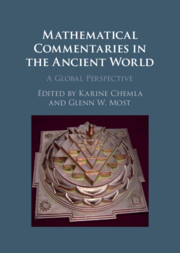Book contents
- Mathematical Commentaries in the Ancient World
- Mathematical Commentaries in the Ancient World
- Copyright page
- Contents
- Figures
- Tables
- Contributors
- Introduction
- Commentators at Work
- 2 Philosophical Commentaries on Mathematical Texts
- 3 Characterizing a Sanskrit Mathematical Commentary
- 4 Calling out Zheng Xuan (127–200 CE) at the Crossroads of Ritual, Mathematics, Sport, and Classical Commentary
- Comparing Commentaries
- Index of Proper Names
- Index of Subjects
- Index of Titles of Cited Texts
- References
2 - Philosophical Commentaries on Mathematical Texts
The Case of Proclus’ Commentary on the First Book of Euclid’s Elements
from Commentators at Work
Published online by Cambridge University Press: 02 June 2022
- Mathematical Commentaries in the Ancient World
- Mathematical Commentaries in the Ancient World
- Copyright page
- Contents
- Figures
- Tables
- Contributors
- Introduction
- Commentators at Work
- 2 Philosophical Commentaries on Mathematical Texts
- 3 Characterizing a Sanskrit Mathematical Commentary
- 4 Calling out Zheng Xuan (127–200 CE) at the Crossroads of Ritual, Mathematics, Sport, and Classical Commentary
- Comparing Commentaries
- Index of Proper Names
- Index of Subjects
- Index of Titles of Cited Texts
- References
Summary
Greek philosophical commentaries in general and Proclus’ commentary on the first book of Euclid’s Elements in particular raise the question how these exegetical and pedagogical works can serve also as a means for developing philosophical ideas. In this chapter I address this question, arguing that the assumption that commenting on texts and developing philosophical views are mutually exclusive activities does not hold for Greek philosophical commentaries because their pedagogical aims are not distinct from their philosophical aims, and because their authors did not regard the canonical texts on which they commented as being necessarily authoritative. In view of these observations, I examine Proclus’ commentary on Euclid’s Elements, showing that it does not differ from other philosophical commentaries in its pedagogical approach and treatment of its base text. Specifically, I show that this commentary’s didactic aim is to teach the demonstrative method and that this is not distinct from its philosophical aim, which is to secure Aristotelian explanatory demonstrations in geometry. This examination highlights Proclus’ complex engagement with Euclid’s Elements. On the one hand, he used this work as a model for teaching rigorous reasoning and adapted the philosophical views of his predecessors, most notably Aristotle’s account of scientific method, to the mode of reasoning found therein. On the other hand, he used it as a basis for further philosophical inquiry into the question of mathematical explanation. This complex engagement makes Proclus’ commentary on the Elements both a secondary text and a philosophical work in its own right.
Keywords
Information
- Type
- Chapter
- Information
- Mathematical Commentaries in the Ancient WorldA Global Perspective, pp. 53 - 95Publisher: Cambridge University PressPrint publication year: 2022
